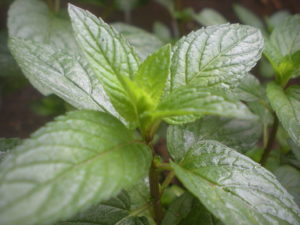Peppermint
Peppermint needs very little introduction since it is one of the most popular essences that we use in daily life. From the moment we awake and brush our teeth, mint is a part of our routines-– we use it in mouthwashes, shampoos, soaps, lotions, in our teas, in cooking and in our health care.
Peppermint essential oil is steam distilled from the Mentha Piperita plant when it is mature and in full bloom. It is a wonderful oil to have in a first aid kit, although because of its strength, mint essential oil should only be used in acute cases and not over a prolonged period of time. Mint can also antidote homeopathic remedies so should be avoided if you are on a homeopathic treatment.
Otherwise, peppermint is one of the best oils to use for a wide variety of ailments. Because it works into the hippocampus part of the brain, like rosemary, it stimulates mental activity and is excellent for mental fatigue, memory loss and the inability to concentrate. Mint burned in an aroma lamp when studying for exams or preparing a thesis is a wonderful way of helping the mind to focus clearly and remember more. It clears the head and refreshes the spirit. It also is good for dizzy spells, nervous tension, rapid heartbeat, depression and headaches caused by mental over-exertion.
Headaches caused by digestive disorders can also be soothed by peppermint. This plant has long been used in digestive aids such as antacids and after dinner teas. Restaurants sometimes offer mints with the bill, not only to freshen the breath but maybe also to ease digestion as well. Peppermint calms nausea, motion sickness, is safe for women with morning sickness, and can settle stomachs after vomiting. This oil, when taken in small doses internally can also help with flatulence, giving the dispelled gas a faint minty odor. It works really well with dogs that have gastric challenges-- a drop or two in their water will work wonders…
For colds and flu symptoms, peppermint can be used with tea tree or eucalyptus to alleviate congestion and mucous. It is a good expectorant and has antiseptic and disinfectant properties as well. Burned in the room, mint can kill germs in the air while helping with mental clarity. The main constituent of mint is menthol, which seems to have a cooling effect while heating and invigorating the body. It affects the lymphatic system, stimulating lymphatic drainage. Mint also acts on the circulatory system, increasing blood flow. When massaged into an area on the body this oil can help in relieving muscle pain, stiff joints, lumbago and sports injuries. Peppermint works both on mental stress as well as the physical tension caused by the stress and is a great massage oil to rub on the back of the neck where tension most often settles. It not only releases the muscle tension, but seems to relieve the mental confusion and help focus the mind so that the stress disappears.
Peppermint is considered a yang oil, and supports the 7th chakra. Clairvoyance and an increased sense of spirituality can be achieved by burning mint incense or bathing in a few drops of this delicious oil. Focus on one’s path and spiritual direction are offered in the many gifts that mint brings to us. It is an herb to be honored and grown with thanks and love in our gardens.
essential oil, essential oils, aromatherapy, peppermint essential oil, peppermint, aromatherapy peppermint, headaches, essential oils for headaches, essential oils for digestion, aromatherapy for digestive disorders, aroamtherapy for headaches

